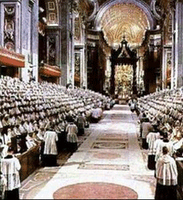Friday, September 15, 2006
 In the original Pauline Theology of the Body, diversity is a big plus for Christians, and nowhere is this diversity so noticeable as in the laity:
In the original Pauline Theology of the Body, diversity is a big plus for Christians, and nowhere is this diversity so noticeable as in the laity:
By divine institution Holy Church is ordered and governed with a wonderful diversity. "For just as in one body we have many members, yet all the members have not the same function, so we, the many, are one body in Christ, but severally members one of another".(Rom. 12, 4-5) Therefore, the chosen People of God is one: "one Lord, one faith, one baptism"(cf Eph. 4, 5.); sharing a common dignity as members from their regeneration in Christ, having the same filial grace and the same vocation to perfection; possessing in common one salvation, one hope and one undivided charity. There is, therefore, in Christ and in the Church no inequality on,the basis of race or nationality, social condition or sex, because "there is neither Jew nor Greek: there is neither bond nor free: there is neither male nor female. For you are all 'one' in Christ Jesus".(Gal. 3, 28; cf. Col. 3, 11.)
If everybody's running off in different directions, what's the commonality? The call to holiness.
If therefore in the Church everyone does not proceed by the same path, nevertheless all are called to sanctity and have received an equal privilege of faith through the justice of God.(Cf. 2 Pt. 1,1.) And if by the will of Christ some are made teachers, pastors and dispensers of mysteries on behalf of others, yet all share a true equality with regard to the dignity and to the activity common to all the faithful for the building up of the Body of Christ.
The council bishops argue for unity in distinction:
For the distinction which the Lord made between sacred ministers and the rest of the People of God bears within it a certain union, since pastors and the other faithful are bound to each other by a mutual need. Pastors of the Church, following the example of the Lord, should minister to one another and to the other faithful. These in their turn should enthusiastically lend their joint assistance to their pastors and teachers. Thus in their diversity all bear witness to the wonderful unity in the Body of Christ. This very diversity of graces, ministries and works gathers the children of God into one, because "all these things are the work of one and the same Spirit".(1 Cor. 12, 11.)
The section closes with a famoud quote from St. Augustine:
Therefore, from divine choice the laity have Christ for their brothers (and sisters) who though He is the Lord of all, came not to be served but to serve.(Cf. Mt. 20, 28.) They also have for their brothers those in the sacred ministry who by teaching, by sanctifying and by ruling with the authority of Christ feed the family of God so that the new commandment of charity may be fulfilled by all. St. Augustine puts this very beautifully when he says: "What I am for you terrifies me; what I am with you consoles me. For you I am a bishop; but with you I am a Christian. The former is a duty; the latter a grace. The former is a danger; the latter, salvation" (S. Augustinus, Serm. 340, 1: PL 38, 1483.).
Thoughts?